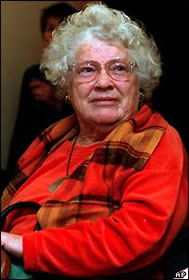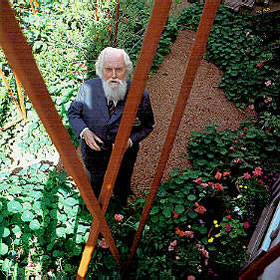Janet Frame werd geboren in Dunedin en groeide op in Oamaru. Ze ontving haar opvoeding in Waitaki Girls’ High School en het Dunedin Teachers College. Later leefde ze lange tijd in Londen en in de VS.. In 1947 werd er bij vergissing schizofrenie bij haar geconstateerd en liet zij zich opnemen in het Seacliff Mental Hospital. Ze bracht zeven jaar onder uiterst moeilijke omstandigheden door in verschillende psychiatrische klinieken en onderging meer dan tweehonderd elektroshocks. In deze tijd publiceerde zij haar eerste boek, een verzameling korte verhalen getiteld De lagune (The Lagoon and Other Stories, 1951). Op het moment dat haar boek de Hubert Church Memorial Award ontving, scheelde het niet veel of ze moest een lobotomie ondergaan. Door haar literaire werk raakte men uiteindelijk overtuigd dat zij niet geestelijk gestoord was.In 1956 verliet ze Nieuw-Zeeland met financiële ondersteuning van het State Literary Fund. Ze woonde gedurende zeven jaar op Ibiza, in Andorra en in Engeland.
Werk o.a: Owls Do Cry (1957), The Pocket Mirror(1967), An Angel at My Table (1984)
The End
At the end
I have to move my sight up or down.
The path stops here.
Up is heaven, down is ocean
or, more simply, sky and sea rivalling
in welcome, crying Fly (or Drown) in me.
I have always found it hard to resist an invitation
especially when I have come to a dead end
a
dead
end.
The trees that grow along cliff-faces,
having suffered much from weather, put out thorns
taste of salt
ignore leaf-perm and polish:
hags under matted white hair
parcels of salt with the string tangled;
underneath
thumping the earth with their rebellious root-foot
trying to knock up
peace
out of her deep sleep.
I suppose, here, at the end, if I put out a path upon the air
I could walk on it, continue my life;
a plastic carpet, tight-rope style
but I’ve nothing beyond the end to hitch it to,
I can’t see into the mist around the ocean;
I shall have to change to a bird or a fish.
I can’t camp here at the end.
I wouldn’t survive
unless returning to a mythical time
I became a tree
toothless with my eyes full of salt spray;
rooted, protesting on the edge of this cliff
– Let me stay!
Eater of Crayfish
Commonplace, divine, bald, at home,
licking day-long breath from the walls of his air-cell
he will eat the crayfish green-garnished in its blush of dying,
burned, like love, in and beyond the salt element.
He will taste the embarrassment of dying,
tear off the livid armour hiding the bloodless flesh,
destroy the cable laid along the sea-bed
communicating bloom of excrement.
From the time he is born he will need to eat this crayfish,
his left hand love, his right hand hate, he will take
larger and larger meals of nightmare till his life accumulates
eyes, eyes, that walk on twigs under the sea.

Janet Frame (28 augustus 1924 – 29 januari 2004)
William Robertson Davies werd geboren op 28 augustus 1913 in Thamesville, Ontario, Canada. Hij studeerde in Oxford en genoot een opleiding in acteren, regisseren en toneel management bij de Old Vic Repertory Company. Hij werkte van 1942 tot 1963 bij de Peterborough Examiner, een krant die in het bezit was van zijn familie en doceerde Engels aan de universiteit van Toronto van 1960 tot 1981.
Roberson Davies’ vroege roem was gebaseerd op de toneelstukken Eros at Breakfast (1949) en At My Heart’s Core (1950), die een satire vormen op de Canadese normen en waarden. Hij publiceerde ook humoristische essays als The Diary of Samuel Marchbanks (1947); The Table Talk of Samuel Marchbanks (1949) en Samuel Marchbanks’ Almanack (1967).
Roberson Davies’ drie romantrilogies bevestigden zijn faam als Candada’s belangrijkste letterkundige. De eerste, de Salterton trilogie, bestaat uit Tempest-Tost (1951), Leaven of Malice (1954) en A Mixture of Frailties (1958), speelt zich af in een provinciale Canadese universiteitsstad. De Cornish trilogie bestaat uit The Rebel Angels (1981), What’s Bred in the Bone (1985) en The Lyre of Orpheus (1988). Het is een satire op de wereld van de kunst, de opera en andere aspecten van de hogere cultuur in Canada. Murther & Walking Spirits, geschreven vanuit het perspectief van een dode man, verscheen in 1991. Davies’stierf op 2 december 1995 in Orangeville, Ontario.
Citaten:
“ I once had a dispute with a group of Swedish professors at the University of Uppsala as to which country, Sweden or Canada, was the dullest in the world. It was a draw; they claimed superiority because of their long history, and I claimed it because of Canada’s immense land mass, which gives us space for tremendous expansion, even of such things as dullness.”
“ This strengthens a belief which I have long cherished, that in a few centuries women will be the larger, stronger sex, admired for their biceps and superfluous hair, and that men will be their toys and domestic comforters, exciting tenderness in the female breast by their small feet, pretty soft hands, and general helplessness. I do not think I have a heart, for I have never been able to locate my pulse, or any other symptom of a circulatory system, but I am willing to share any of the benefits of male delicacy.”
“ Have you never read the manifesto of the Marchbanks Humanist Party? How does it begin?
The more taboos and prohibitions there are in the world
The poorer the people will be.
The more sharp weapons the people have
The more troubled the state will be.
The more cunning and skill man possesses
The more vicious things will appear.
The more laws and orders are made prominent
The more thieves and robbers there will be.
And who wrote that, do you suppose?” “You, I imagine.” “No, you don’t imagine. That’s what’s wrong with you, and your kind; you don’t, and can’t imagine. Those words were written by the Chinese sage Lao Tzu in the sixth century BC.”

William Robertson Davies (28 augustus 1913 – 2 december 1995)
